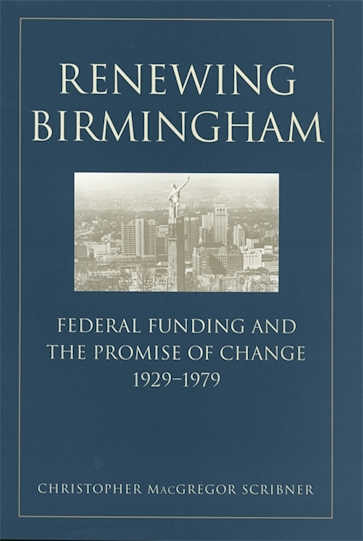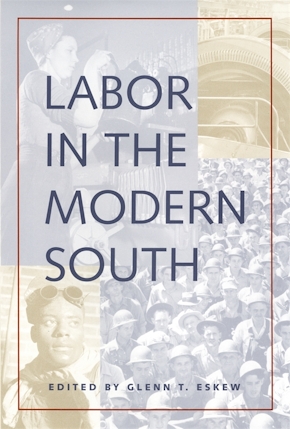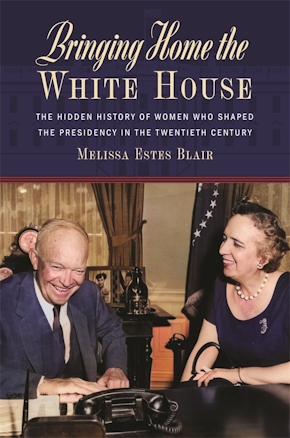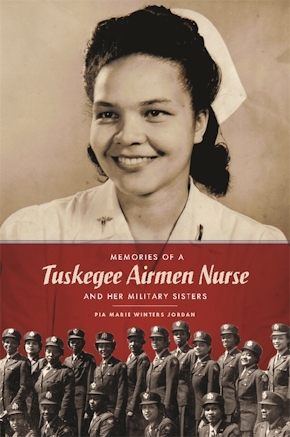Renewing Birmingham
Federal Funding and the Promise of Change, 1929-1979
Title Details
Pages: 200
Trim size: 6.000in x 9.000in
Formats
Hardcover
Pub Date: 03/12/2002
ISBN: 9-780-8203-2328-2
List Price: $48.95
Related Subjects
HISTORY / United States / 20th Century
POLITICAL SCIENCE / Public Policy / City Planning & Urban Development
POLITICAL SCIENCE / Public Policy / Social Services & Welfare
Renewing Birmingham
Federal Funding and the Promise of Change, 1929-1979
Skip to
- Description
- Reviews
Renewing Birmingham is the first book-length study of how federal funding helped transform a twentieth-century southern city. Christopher MacGregor Scribner shows that such funding not only aided Birmingham's transition from an industrial to a service economy but also led to redrawn avenues of power, influence, and justice in the city.
By the 1960s Alabama's largest city faced wrenching changes brought on by economic decline, suburbanization, and racial tension. Decades in the making, these problems pitted old-guard politicians, manufacturing elites, and working-class whites against an alternative vision, kindled by federal dollars, of Birmingham's future.
Scribner uses the Birmingham experience to trace the evolution of federal grants from extensions of Depression-era fiscal policy to instruments of social change. As he discusses federal backing of projects ranging from low-income housing to the University of Alabama Medical College, Scribner also shows how control of the grant purse, which once belonged exclusively to politicians, came to be shared with bureaucrats and activists, local and federal participants, and blacks and whites. Most important in Birmingham's case, debates over spending drew in entrepreneurs in fields as diverse as biomedicine and education, real estate and construction. This complicated bargaining and coalition-building sparked a "quiet revolution" that had begun hollowing out the core of Birmingham's old order even as civil rights protests cemented the city's segregationist reputation.
Scribner stresses that the social benefits of Birmingham's economic rebirth reflected not so much a change of heart for the city as an admission that segregation was simply bad for business. As a new Birmingham ascended—and became less distinguishable from other American cities—aspects of its racist, elitist past persisted. In learning the particulars of Birmingham we come closer to understanding how the South can be at odds with the rest of the country even as it participates in national trends.
Scribner sets forth a new direction in the way we study the modern South and its relationship to the federal government. . . . Scribner has presented the readers with an illuminating study of how city boosters used federal grants in the face of racial tension, political warfare, and economic sluggishness.
—EH.Net
The comprehensive works of Bruce J. Schulman and Pete Daniel and the fine case studies of Ronald H. Bayor on Atlanta and Thomas Hanchett on Charlotte highlight the transformative role of federal policy in the South since the 1930's. Christopher MacGregor Scribner's well-researched and clearly written analysis of the impact of federal funding on Birmingham reinforces that growing literature, but it also underscores the limits of change, especially with respect to race.
—Journal of American History
Scribner's well-constructed and thoughtful study . . . addresses Birmingham's special circumstances and also places the city in the larger national context in which the policy and largesse of the U.S. government systematically transformed American cities.
—Journal of Southern History
Christopher Scribner has made a significant contribution to the historical literature on Birmingham before, during, and after the civil rights era.
—Alabama Review
An authoritative work . . . It sheds valuable light on the culture (and its proponents) of overt racism that plagued Birmingham during this time. Furthermore, Scribner's work serves as an acknowledgement of the humane individuals who advanced their moral and just claims, sometimes against daunting odds, in order to finally bring about the abolition of segregation.
—Southern Historian



